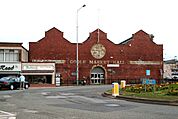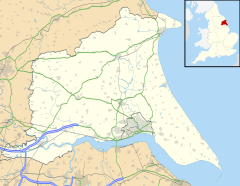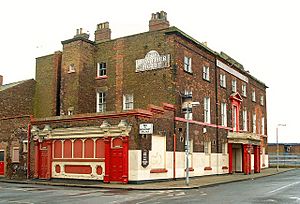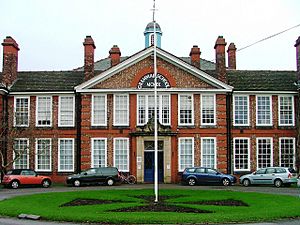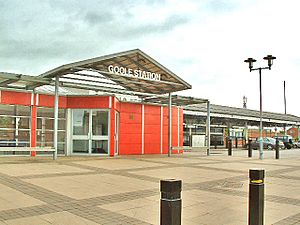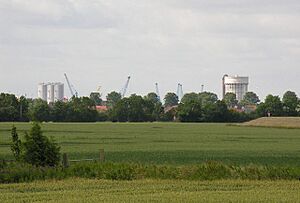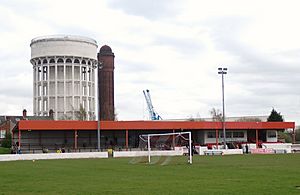Goole facts for kids
Quick facts for kids Goole |
|
|---|---|
|
From the top left: St John's Church, Market Hall, Boothferry Road and the Port of Goole with the "Salt & Pepper" towers in the background |
|
| Population | 20,475 (2021 Census) |
| OS grid reference | SE746231 |
| Civil parish |
|
| Unitary authority | |
| Ceremonial county | |
| Region | |
| Country | England |
| Sovereign state | United Kingdom |
| Post town | GOOLE |
| Postcode district | DN14 |
| Dialling code | 01405 |
| Police | Humberside |
| Fire | Humberside |
| Ambulance | Yorkshire |
| EU Parliament | Yorkshire and the Humber |
| UK Parliament |
|
Goole is a town with a port in East Riding of Yorkshire, England. It sits by the River Ouse. Historically, it was part of the West Riding of Yorkshire.
In 2021, about 20,475 people lived in Goole. It's about 26 km (16 miles) northeast of Doncaster and 31 km (19 miles) south of York.
Goole has the United Kingdom's furthest inland port. It is about 80 km (50 miles) from the North Sea. This port can handle nearly 2 million tonnes of goods each year. This makes it a very important port on England's east coast.
Goole is twinned with Złotów in Poland. In the 1960s, Goole was also informally twinned with Gibraltar.
Contents
History of Goole
What Does the Name Goole Mean?
The name Goole was first recorded in 1306. It was called Gull Lewth, where lewth meant 'barn'. Later, in 1362, it was Gulle in Houke, referring to the nearby village of Hook.
The shorter, modern name 'Goole' appeared in the 1530s. It comes from an old word meaning 'a channel made by a stream'. Some people thought it meant an open sewer, but this is not likely. The area had many land drains because the land was very flat.
How Goole Started
In 1626, a Dutch engineer named Cornelius Vermuyden changed the path of the River Don. He moved it north to the River Ouse. This was done to drain the marshy land of Hatfield Chase for King Charles I.
This new part of the Don, called the Dutch River, became navigable for barges. This allowed coal from the South Yorkshire Coalfield to be moved. It could then be transferred to larger ships that could go to sea. Engineers built a new wooden bridge where the rivers met. A new village called 'Goole' grew to the east of this bridge.
How Goole Grew
In the 1820s, the Aire and Calder Navigation company planned a new canal. This canal would transport coal from Knottingley. The company also wanted to build a new floating dock in Goole. This dock would be able to handle larger ships.
Thomas Hamond Bartholomew, the chief engineer, was told to build the canal, docks, and a new town. This town would house the dock workers and visiting sailors. Sir Edward Banks helped build part of the canal and eight docks. He also helped plan the new town.
The Banks Arms Hotel, now called the Lowther Hotel, was built in 1824. It was the first building in what was known as New Goole. Another building, The Macintosh Arms public house, was named after engineer Hugh Macintosh.
When Goole port opened on July 20, 1826, it was a small community of about 450 people. Today, it is a town with around 18,000 residents.
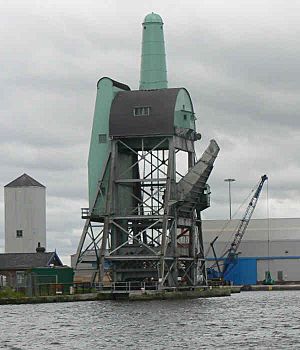
In 1863, William Hamond Bartholomew introduced the Tom Pudding system. This system used special boats that could carry about 40 tonnes (40 LT) of coal. When these boats reached the docks, large hoists would lift them. The coal could then be directly unloaded into sea-going ships. This system was very successful and was used until 1985.
Education in Goole
Goole has several primary schools for younger children. It also has Goole High School for older students. Riverside School is a special needs school for ages 2 to 19.
There are also further education colleges in nearby towns like Selby, York, and Scunthorpe. Goole College closed in 2021. It is now being used as a temporary gym while the Goole Leisure Centre is being rebuilt.
Getting Around Goole
The Lancashire and Yorkshire Railway built a train line from Pontefract and Wakefield in 1848. The North Eastern Railway connected Goole with Doncaster and Hull in 1870. The port was very busy for 150 years, trading coal and other goods.
Today, Goole railway station is a meeting point for two train lines. You can catch trains to Hull Paragon Interchange, Doncaster, Sheffield, and Leeds.
Goole is south of the M62 motorway. This road connects it to Hull in the east and Leeds in the west. The A63 road goes north to Howden, connecting to the A19 road for Selby and York. The M18 motorway runs west of Goole. It links the town to South Yorkshire and the Midlands.
Bus services connect Goole to nearby towns and villages. These services are run by different companies like East Yorkshire Motor Services. Hull Trains offers direct train services from Goole to London King's Cross.
How Goole is Governed
Before 1974, Goole was part of the West Riding of Yorkshire. Then, it became part of the Boothferry district in Humberside county. In 1996, Humberside was removed, and Goole became part of the East Riding of Yorkshire.
Goole has four councillors who represent it on the East Riding of Yorkshire Council. Goole is also part of the Goole and Pocklington area for the UK Parliament. Since 2024, David Davis from the Conservative Party has been the Member of Parliament for this area.
Famous Landmarks in Goole
Goole's most famous landmarks are its two water towers. People call them 'salt' and 'pepper'. The newer white water tower was the biggest in Europe when it was built. In winter, you can see Goole's gas holder from across the north of the town. Many of the hoists and cranes at the docks are also visible.
The steeple of Goole Parish Church is very tall. It can be seen from all over town. The town mostly has buildings for industry and services. There is a clock tower in the main shopping area. It was built in 1927 and later moved to the middle of a new roundabout. West Park is an old park in the town.
Goole's Economy
Goole has a medium-sized town centre. You can find many well-known shops, local businesses, and public houses there. The main shopping area is Wesley Square, which is a pedestrian-only zone.
There is a modern shopping area in the town centre. Goole also has a leisure centre next to the docks. The Goole and District Hospital is to the north of the town. A theatre and cinema called 'Junction' opened in 2009.
Industries in Goole
Glass is made in Goole. The town is also a centre for farming. Goole used to have a large clothing factory, but it closed in the late 2000s.
Goole's industrial park, called Capitol Park / Goole36, has attracted big companies. Guardian Industries built a glass-making factory there. Tesco also built a large distribution centre. These new businesses created hundreds of jobs.
A new railway rolling stock factory opened at Capitol Park / Goole36 in 2024. This factory is owned by Siemens Mobility. It is currently building new tube trains for the Piccadilly line in London.
On September 21, 2023, a new Metsä Tissue toilet roll factory was announced. It will be built over the next ten years in the Humber Freeport area. This area allows companies to import goods without extra taxes. When finished, the factory will make 240,000 tonnes of tissue paper each year. This paper will be made from fresh wood fibres from Nordic forests.
Goole Docks
Three locks keep the water in Goole's docks at a steady depth of 6 metres (20 ft). The docks cover about 15 hectares (37 acres). This stops the water level from changing with the tides in the River Ouse. Once ships are inside, eight docks offer a total of 4.8 km (3 miles) of quayside.
Next to the docks are sheds where goods are stored. Many of these sheds have overhead cranes. All eight docks have been used for business since they were built between 1826 and 1912.
For most of its history, the port was known for shipping coal. It also imported things like pit props (wooden supports for mines). When coal mining stopped, the old Timber Pond became a marina. It is now called Goole Boathouse and has spaces for 150 boats.
After a period of decline, the port started handling new types of goods. It now deals with containers, exports steel, and imports timber from northern Europe. Today, the Port of Goole has regular shipping services. These go to countries like Norway, Sweden, Germany, and France. There is also a route to Europort in Rotterdam.
Sports in Goole
Goole Town Cricket Club has local cricket teams. Their first team plays in the York & District Senior League. A new clubhouse was built in 1996 with facilities and a bar.
Rugby Union is played near the cricket club at Westfield Banks. This area is shared with Goole Tennis Club and Goole Viking Striders running club. Goole RUFC currently has two teams. The first team plays in Yorkshire Division Two.
From 2025, the Goole Vikings rugby league club will play in League 1.
Goole Tennis Centre is a club with nine tennis courts at the Westfield Banks site.
Goole has two football teams: Goole A.F.C. and Goole United A.F.C. They play at the Victoria Pleasure Grounds on Marcus Street. The nearest professional teams include Rotherham United and Hull City.
Goole used to have two golf clubs. The first course was at Rawcliffe Park, started in 1900. The second was at Airmyn Park from 1911 until World War II. Now, Goole's closest golf clubs are Boothferry Golf Club and Drax Golf Club.
Media in Goole
Television signals in Goole come from either the Emley Moor or Belmont TV transmitters. On Sky and Freesat, people in Goole get BBC One Yorkshire and ITV Yorkshire West.
Local radio stations include BBC Radio Humberside and Capital Yorkshire. Radio Medica is a non-profit hospital radio station. It broadcasts from the Goole And District Hospital.
The town has a weekly newspaper called The Goole Times. It has been published since 1853 and is sold in Goole and nearby areas.
The town is mentioned in the play An Inspector Calls. The main character in the play is named after Goole.
Famous People from Goole
- Nigel Adams, a former Member of Parliament, was born in Goole Hospital.
- John Billington, a stage actor (1828–1904), was born in Goole.
- Gavin Bryars, a composer and double bassist, was born in Goole.
- Roy Clarke, a comedy writer, lives in Goole.
- Noel Duckworth, an Olympic rower and priest, was the first Chaplain of Churchill College.
- Betty, Hazel, and Julie Dunderdale were a singing trio called The Dale Sisters. They had some success in the early 1960s.
- Nicky Featherstone, a professional footballer, was born in Goole.
- Anne Greaves (1889–1971) was the first woman to join the Institute of Quarrying. She created artificial stone.
- Jimmy Mann, a footballer, was born in Goole.
- Sandra's Wedding is a four-piece rock band from Goole.
- Ian Smith, a comedian, was born in Goole.
Gallery
See also
 In Spanish: Goole para niños
In Spanish: Goole para niños
 | John T. Biggers |
 | Thomas Blackshear |
 | Mark Bradford |
 | Beverly Buchanan |



